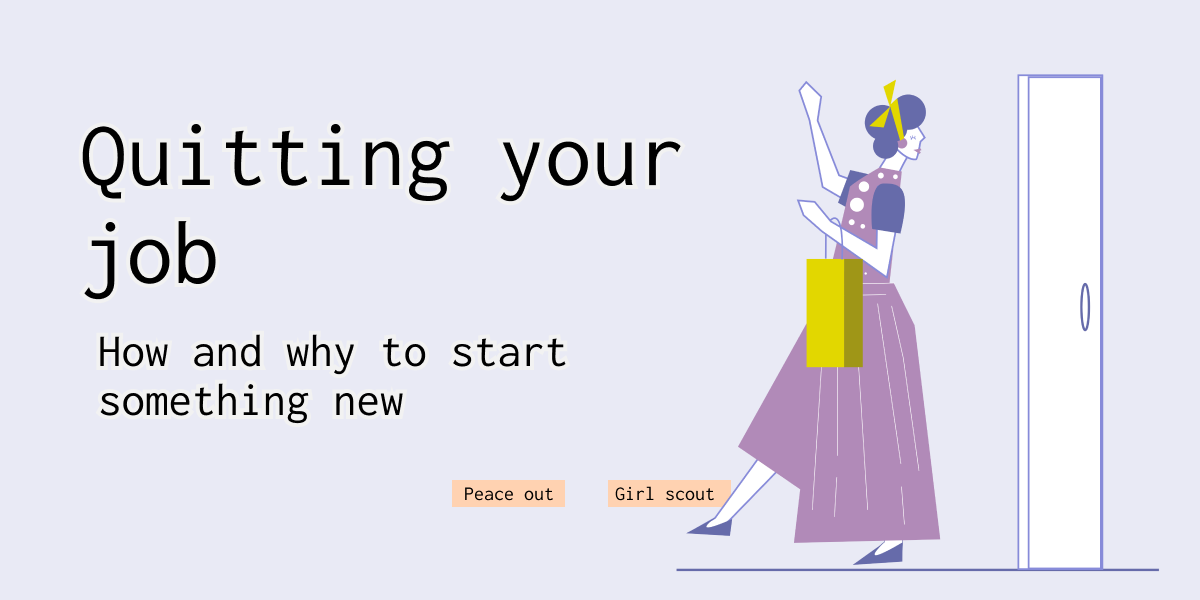In May 2023 I quit my job and left the 9-to-5 workforce to start my own business and become a solopreneur.
I’ve quit a job 4 times in my professional career and many more times as a high school and college student.
Quitting a job is symbolic of starting a new chapter in your life.
I love qutting my job because each time I quit it means I was on the way to something bigger.
If you’re feeling unfulfilled in your current job then stick with me as I take you through everything you need to know about qutting.
Take the leap and find something better.
How To Quit Your Job
- Ensure quitting is the right choice of action
- Talk it through with your spose or significant other
- Invite your boss to a meeting
- Submit your notice in writing
- Create an offboarding plan
- Detail any projects you worked on
- Meet with your colleagues one last time
- Leave with grace
- Send back your equipment
Best Reasons for Quitting Your Job
- Money: You can make more money elsewhere
- Growth: You can join a fast growing company
- Stagnation: Your current company is failing
- Management: Your current manager sucks
- Mental Health: Your current role is bad for your mental health
- Education: You want to go back to school
Quitting your job is a uniquely personal situation, whatever your reason is.
If you feel compelled to quit and you’ve thought it over and discussed with the important people in your life, then in the immortial words of Shia LaBeouf…

How To Tell Your Boss You’re Quitting
Look, this part will either be the easiest or hardest part of quitting your job.
Love your boss? This part sucks.
Hate your boss? Best day of your life.
Quitting a job in the era of remote work is a unique experience.
Most times it starts off with a Slack message (or Microsoft teams, and if that’s your case then you should definitely quit).
Mine usually go like this
Hey can we Zoom for 5 minutes?
To any manager that message is pretty ominous.
Then you get in the call and drop the big message
I’ve found a new opportunity and need to put in my 2 weeks.
Add in some optional flair depending on your circumstances and if you had a good or a bad manager.
Good Manager Version
Use this text if you like your manager.
I’m really grateful for all the opportunities you provided me. You were a good manager and I valued all of your input. You helped support my professional growth and I appreciate you.
Bad Manager Version
Use this text if your manager sucked.
I found a new opportunity and I need to put in my 2 weeks. What’s the process for kicking that off?
Short, sweet, and to the point.
Step 1: Assess Your Reason for Quitting

Before you start applying for jobs, it’s important to take a deep dive into why you want to leave your current position.
Ask yourself what is driving this decision and what you hope to achieve by making a change.
For me, I was tired of working for somebody else.
I hated making powerpoints and convincing other people that the idea I had full conviction over was worth pursuing.
I’ll be honest with you, I’m not great being persuasive in a business setting.
I’m introverted as hell and I only learned how to be successful at business by faking it for a long time that it became part of my personality.
I want to be in charge of the decisions and bear the burden of responsibility.
If I succeed or fail it’s entirely on me.
And that was my motivation for quitting.
Plus I just had one of those really bad Office Space kind of days that pushed me over the edge 🔨.
Identifying Your Motivations
Maybe you’re seeking a higher salary, more flexible working hours, or a better work-life balance.
It’s essential to understand what your professional goals are to ensure that your next job move aligns with them.
For example, if you’re looking for a higher salary, you may want to consider industries or companies that offer higher pay scales.
If you’re seeking more flexible working hours, you may want to explore companies that offer remote work options or flexible schedules.
And maybe you’re totally burned out and need to take a sabattical.
Shit, after Covid I wouldn’t blame you.
But understand your motivations so you can solve them with your new job instead of just leapfrogging into another bad situation.
Evaluating Your Current Job Satisfaction
Make a pros and cons list of your current role to pinpoint specific aspects that aren’t working for you.
Maybe it’s the company culture, the workload, or the lack of growth opportunities.
It’s important to evaluate your current job satisfaction to ensure that you’re not making a hasty decision to leave.
Are there any aspects of your job that you enjoy? Are there any opportunities for growth or development that you may be overlooking?
By evaluating your current job satisfaction, you can determine if there are any changes that can be made to improve your current situation, or if it’s time to move on.
Make sure to address what problems are with your company vs your manager and peers.
Some companies just suck.
And some managers are horrible.
Spend time reflecting on the specific parts of your job that don’t bring you joy and make sure to address them in your next role.
Considering the Pros and Cons of Quitting Your Job
Consider the potential risks and benefits of quitting your job.
Will you need to take a pay cut?
Do you have enough savings to go 6+ months without a job?
The job market is tough right now in mid-2023.
Tech companies are laying off workers in droves so the market is flooded with talent.
It’s important to weigh the pros and cons of quitting your job to ensure that you’re making an informed decision.
While a new job may offer a higher salary or better work-life balance, it may also come with its own set of challenges and adjustments.
When I was researching this article I found other articles that said you should consider the impact that quitting has on the people remaining at your company.
Screw that.
Your company does not care about you.
They do not need you.
You, and everyone else, are replaceable.
Your remaining colleagues will figure out a way to deal with the gap you’re creating.
It’ll be ok.
You have to do what’s best for you because no one else will.
Step 2: Explore New Career Opportunities
Once you have a clear understanding of what you want, start exploring potential job opportunities.
This is an exciting time where you can explore different fields and discover new passions.
Or maybe you don’t want another full time job at all, which is exactly what happened to me.
I was so burned out on working for other people that I spent 9 months of my nights and weekends building up my own passive income streams.
I detail all of them in my newsletter.
Researching Potential Job Fields
Use online tools and resources to identify new job fields that align with your goals and skills.
There are many different websites and resources available that can help you find potential job fields.
Some examples include Indeed, Glassdoor, and LinkedIn, but I’ve had the most success with LinkedIn.
I wrote an entire article on how to optimize your LinkedIn profile.
I haven’t directly applied for jobs since my very first job 10 years ago because my LinkedIn profile does all the selling for me.
Recruiters and hiring managers DM me all the time because of the content I post.
I treat my LinkedIn content as a way to invest in my next job search by posting every day.
So don’t sleep on LinkedIn, as cringey as you think the content is.
Tap Your Network
The best thing you can do right now is reach out to your network.
Anyone you’ve connected with in person at conferences or even just people you chatted with on LinkedIn.
Reach out, say hey, and book time for a coffee chat.
Tell them that you’re leaving and you’re looking for new opportunities.
Chances are they know someone who is hiring or a company that wants to hire a freelancer to solve a problem.
Your network is your biggest asset. Use it.
The best time to network is when you have a job, but you don’t need to have one.
Want to know a networking secret?
Start a podcast.
Hosting a podcast is a great excuse to reach out to people and chat.
Plus you get to learn something in the process.
I started a podcast called Template Titans where I talk to people creating and selling Notion templates.
Start networking now and your future self will thank you.
Attending Job Fairs and Workshops
Look, I’ve never been to a job fair.
I asked an AI to generate this section because I don’t have any personal experience to speak from.
Your success here largely depends on your industry.
I work with tech companies and job fairs aren’t common.
But if you’re a public service worker or you want to work for large companies, this may be a good fit for you.
Visit job fairs and workshops to connect with recruiters and learn about job openings.
These events can be a great way to learn more about different companies and get your foot in the door.
Make sure to come prepared with copies of your resume and business cards.
Dress professionally and be ready to make a great first impression.
You never know who you might meet at these events, so it’s important to put your best foot forward.
When attending job fairs and workshops, it’s important to keep an open mind.
You may discover a job opportunity that you never considered before.
Take the time to talk to different recruiters and learn about their companies.
Ask questions and show a genuine interest in their work.
This will not only help you learn more about potential job opportunities, but it can also help you stand out from other job seekers.
Another great way to explore new career opportunities is by volunteering.
Volunteering can help you gain new skills and experiences that can be valuable in your job search.
It can also help you make valuable connections and build your professional network.
Look for volunteer opportunities in your desired field or with organizations that align with your values and interests.
Remember, exploring new career opportunities can be a fun and exciting process.
Take the time to research different fields, network with industry professionals, and attend job fairs and workshops.
With a little bit of effort and determination, you can find your dream job and take the next step in your career.
Step 3: Update Your Resume and Cover Letter
Look, some people will tell you your resume and cover letter are crucial.
It’s all bullshit.
My LinkedIn profile is the best resume I could create.
Not only does it have my job history but it has years of content on it.
Over 6,000 people follow me on LinkedIn too which recruiters 100% look at when evaluating candidates.
Recruiters and hiring managers can review my past content to see if I actually know what the hell I’m talking about.
And as someone who has hired a ton of people in their career, let me tell you a secret.
99% of cover letters are worthless.
If you want to stand out I wrote an entire post on writing a cover letter that doesn’t suck.
Highlighting Relevant Skills and Experience
One of the most important things you can do is to focus on highlighting your most relevant skills and experience that align with the job requirements.
Take a close look at the job description and make sure you’re emphasizing the skills and experiences that are most relevant to the position you’re applying for.
For example, if the job requires experience with a specific software program, make sure you highlight your experience with that program prominently on your resume.
But also talk about the results you achieved.
And please for the love of god don’t say you know Google Docs or Microsoft Office.
It’s the most meaningless skill to list on a resume because if you can’t use those tools then you’re hopeless in the workforce right now.
Tailoring Your Documents for Each Application
It’s also important to remember that you shouldn’t just use the same resume and cover letter for every job you apply for.
Customizing your application materials for each job shows that you’re genuinely interested in the position and have taken the time to understand the company and its needs.
Take the time to research the company and the position you’re applying for.
Look for keywords and phrases in the job description that you can incorporate into your resume and cover letter.
Seeking Professional Feedback
Finally, it’s always a good idea to get a second opinion on your application materials.
Consider seeking feedback from a career counselor or a trusted colleague who has experience in your field.
They can provide valuable feedback on everything from the formatting of your resume to the tone of your cover letter.
They can also help you identify areas where you may need to add more detail or clarify your experience.
By following these tips, you can ensure that your resume and cover letter are strong, effective, and tailored to each job application.
Step 4: Apply for Jobs and Attend Interviews
Now that you’ve narrowed down your job search and updated your application materials, it’s time to start applying for jobs and preparing for interviews.
This can be an exciting and nerve-wracking time, but with the right preparation, you can increase your chances of landing your dream job.
Utilizing Online Job Boards
One of the best ways to discover new job postings is to use online job boards.
Websites like Indeed, Monster, and Glassdoor offer a wealth of opportunities for job seekers.
You can search by job title, location, and company to find positions that match your skills and experience.
Once you’ve found a job that interests you, be sure to read the job description carefully and tailor your application materials to the specific requirements of the position.
When applying for jobs online, it’s important to make sure your resume and cover letter are up-to-date and well-written.
Your resume should highlight your relevant skills and experience, while your cover letter should explain why you’re interested in the position and why you’re the best candidate for the job.
Be sure to proofread your application materials carefully before submitting them.
Acing the Interview Process
Once you’ve submitted your application, it’s time to start preparing for interviews.
Research the company and learn as much as you can about their mission, values, and culture.
This will help you answer interview questions more effectively and demonstrate your interest in the company.
Practice common interview questions with a friend or family member to help you feel more comfortable during the interview.
Dress appropriately and arrive on time to make a good first impression.
During the interview, be sure to listen carefully to the interviewer’s questions and answer honestly and confidently.
Following Up with Potential Employers
After the interview, it’s important to follow up with the employer to express your interest in the position and thank them for their time.
Send a brief email or handwritten note thanking the interviewer for the opportunity to interview and reiterating your interest in the position.
This will help you stand out from other candidates and demonstrate your professionalism and enthusiasm.
Remember, the job search process can be a long and challenging journey, but with persistence and preparation, you can find the right job for you.
Good luck!
